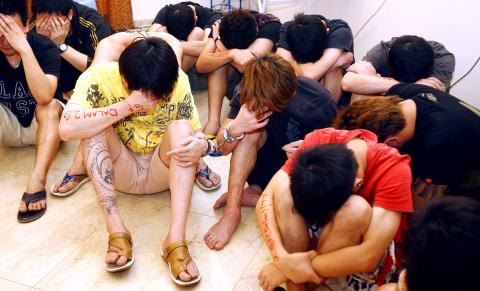A soccer betting and fraud ring busted by Malaysian police grossed more than US$1 billion, reports said yesterday, after an operation that led to the arrests of scores of Chinese and Taiwanese nationals.
Police conducted the raid in the city of Kajang, near Malaysia’s capital, Kuala Lumpur, on Thursday after receiving a tip-off, the latest high-profile effort to clamp down on rampant illegal sports betting in Asia.
The Malaysia ring operated for a month from several luxury bungalows in an upscale gated community “home to several ministers and former cabinet members,” the Star newspaper reported.

Photo: AFP
Police believe the operation grossed nearly 4 billion ringgit (US$1.3 billion), it said.
The bungalows had closed-circuit video systems for security and police found “suspects engrossed in their laptops and telephones in a classroom-like atmosphere with all the tables neatly arranged in rows,” the report added.
Suspects were equipped with 241 mobile phones and 43 computers, the New Straits Times said.
Kajang police chief Abdul Rashid Abdul Wahab said on Thursday the group took bets on English Premier League soccer games and organized other forms of online gambling.
Soccer, particularly the English game, is hugely popular in Malaysia, but sports betting is illegal and those found guilty can be jailed.
Abdul Rashid said the group also carried out Internet scams that sought to obtain the credit card numbers of people in Taiwan, China and Portugal.
The Star said members had detailed scripts to follow in dealing with victims.
Abdul Rashid said 132 Chinese and Taiwanese nationals, along with five Malaysians, were arrested, but the Star quoted police sources saying 144 people were netted, including 54 women.
Reports quoted police as saying the foreign suspects, mostly in their 20s, had arrived in Malaysia early last month.
Neither the police nor the press reports have indicated who was behind the operation.

CHAOS: Iranians took to the streets playing celebratory music after reports of Khamenei’s death on Saturday, while mourners also gathered in Tehran yesterday Iranian Supreme Leader Ayatollah Ali Khamenei was killed in a major attack on Iran launched by Israel and the US, throwing the future of the Islamic republic into doubt and raising the risk of regional instability. Iranian state television and the state-run IRNA news agency announced the 86-year-old’s death early yesterday. US President Donald Trump said it gave Iranians their “greatest chance” to “take back” their country. The announcements came after a joint US and Israeli aerial bombardment that targeted Iranian military and governmental sites. Trump said the “heavy and pinpoint bombing” would continue through the week or as long

TRUST: The KMT said it respected the US’ timing and considerations, and hoped it would continue to honor its commitments to helping Taiwan bolster its defenses and deterrence US President Donald Trump is delaying a multibillion-dollar arms sale to Taiwan to ensure his visit to Beijing is successful, a New York Times report said. The weapons sales package has stalled in the US Department of State, the report said, citing US officials it did not identify. The White House has told agencies not to push forward ahead of Trump’s meeting with Chinese President Xi Jinping (習近平), it said. The two last month held a phone call to discuss trade and geopolitical flashpoints ahead of the summit. Xi raised the Taiwan issue and urged the US to handle arms sales to

BIG SPENDERS: Foreign investors bought the most Taiwan equities since 2005, signaling confidence that an AI boom would continue to benefit chipmakers Taiwan Semiconductor Manufacturing Co’s (TSMC, 台積電) market capitalization swelled to US$2 trillion for the first time following a 4.25 percent rally in its American depositary receipts (ADR) overnight, putting the world’s biggest contract chipmaker sixth on the list of the world’s biggest companies by market capitalization, just behind Amazon.com Inc. The site CompaniesMarketcap.com ranked TSMC ahead of Saudi Aramco and Meta Platforms Inc. The Taiwanese company’s ADRs on Tuesday surged to US$385.75 on the New York Stock Exchange, as strong demand for artificial intelligence (AI) applications led to chip supply constraints and boost revenue growth to record-breaking levels. Each TSMC ADR represents

State-run CPC Corp, Taiwan (CPC, 台灣中油) yesterday said that it had confirmed on Saturday night with its liquefied natural gas (LNG) and crude oil suppliers that shipments are proceeding as scheduled and that domestic supplies remain unaffected. The CPC yesterday announced the gasoline and diesel prices will rise by NT$0.2 and NT$0.4 per liter, respectively, starting Monday, citing Middle East tensions and blizzards in the eastern United States. CPC also iterated it has been reducing the proportion of crude oil imports from the Middle East and diversifying its supply sources in the past few years in response to geopolitical risks, expanding